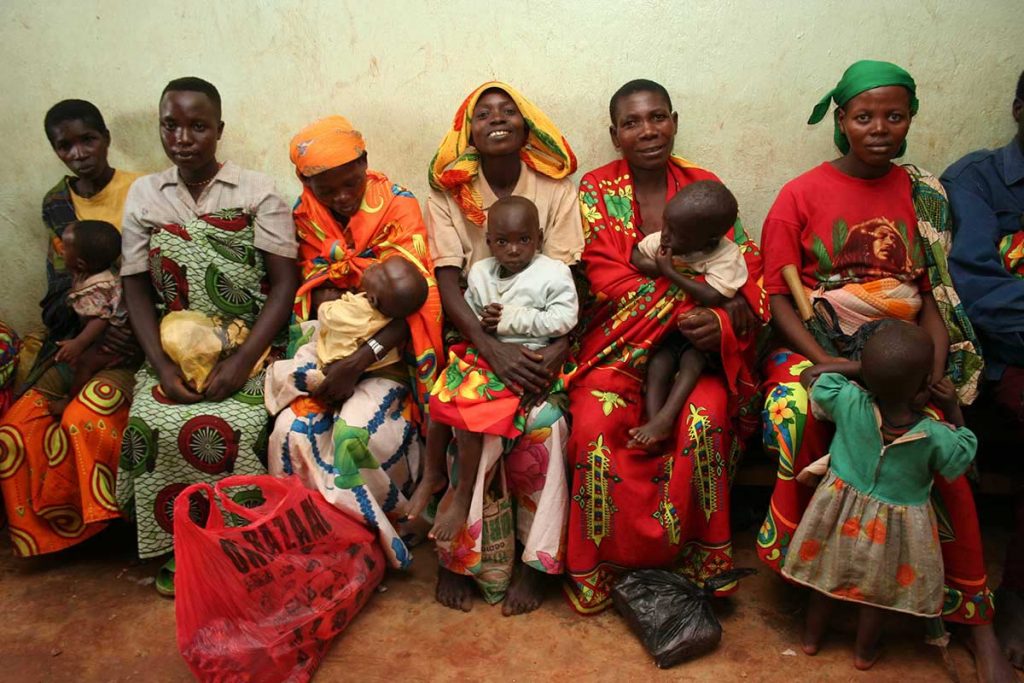
Burundi
International Medical Corps has operated in Burundi since 1995, implementing emergency and development programs to address the needs of vulnerable people, including those in areas of armed conflict. We work in more than half of Burundi’s 18 provinces, including Bujumbura, Bururi, Cankuzo, Gitega, Kayanza, Kirundo, Makamba, Muramvya, Muyinga, Rumonge, Ruyigi and Rutana. Our programs span primary healthcare, nutrition and gender-based violence treatment and prevention. In 2019, we also responded to a massive outbreak of malaria in the country, and contributed to national preparedness efforts to prevent the spread of Ebola from its neighbor, the Democratic Republic of the Congo.
Throughout all of our programs, we work to strengthen Burundi’s health system by supplying partners with medicine and medical equipment, and by offering the Ministry of Health the technical support required to develop effective national health strategies.

11.2 Million
57.5 years
82,000
The Challenges
Our Response

Primary Healthcare
International Medical Corps has trained local healthcare professionals, community-based health workers and community leaders in effective preventative and curative primary healthcare practices. Our teams teach community health workers to provide better nutrition and health for children by addressing the root causes of malnutrition, by educating mothers and care givers about infant and young-child feeding (IYCF), and focusing on water, sanitation and hygiene (WASH) and home management of common childhood illness. We have worked closely with other NGOs to support the Ministry of Health’s implementation of child-growth monitoring programs and childhood-illness management at more than 60 health facilities at the community level. We have implemented 12 pilot programs supporting child-growth monitoring—work that inspired the ministry to initiate an additional six programs.

Nutrition and Food Security
International Medical Corps recently ended a five-year food-security program designed to increase health and nutrition levels among communities in Burundi’s northeastern Muyinga province. Our objective was to reduce stunting among children under 5 by 10%. To achieve this goal, we supported the Ministry of Health (MoH) in its implementation of IYCF practices and included MoH staff in our extensive training sessions designed for local health professionals. We also supported the MoH in its efforts to establish a long-term food-security and nutrition strategy across the country.

Community-Based Programs
Community-based Nutrition: Promotion of Infant and Young-Child Feeding. Promoting optimal IYCF practices is an essential part of international Medical Corps’ strategies to achieve community best practices in nutrition. IYCF is also the cornerstone of our nutrition interventions in food-security programs aimed at reducing stunting during a child’s critical first 1,000 days of life. In Burundi, chronic malnutrition affects more than half of all children, according to the 2017 Demography and Health Survey. We have worked with the Ministry of Health to develop national training modules. We have also developed behavior change messages and posters promoting the benefits of IYCF.
Social Behavior Change Communications. International Medical Corps includes social behavior change communications (SBCC) strategies in all its Burundi programs. These strategies include conducting barrier analyses early in the program, then using the results to improve methods for educating communities on good health and nutrition practices and to encourage the adoption of these methods. We also use home visits and childcare groups led by “lead mothers” trained in best practices and positive deviance awareness to encourage adoption of healthier practices. In a multi-year assistance program funded by USAID from 2008–2012, we supported nearly 200 lead mothers along with 1,440 Community Health Workers as they successfully promoted key health and nutrition practices in communities covering three provinces. The newly adopted practices resulted in significantly more mothers breastfeeding their newborn child within one hour of birth—a step that often leads to exclusive breastfeeding. Our data also demonstrate an increase in the proportion of children under 12 months of age completing the recommended immunizations, and more mothers using fluids to re-hydrate their children following episodes of diarrhea. The number of households using an improved toilet increased more than three-fold, from 6.8% to 21.5%.
Ebola. Following an outbreak of Ebola in the Democratic Republic of the Congo in August 2018—now the second-largest outbreak in history—Burundi was one of nine neighboring priority countries identified by the World Health Organization as vulnerable to the outbreak’s spread. International Medical Corps is currently contributing to ongoing preparedness efforts to prevent the spread of Ebola in 10 out of the country’s 21 priority districts. Our activities include training rapid response teams; implementing surveillance, reporting and isolation procedures at points of entry; and creating isolation rooms for suspected cases at five hospitals.
Malaria. Burundi experienced a malaria epidemic in 2019, with more than 6 million new cases reported since January—a number equal to half of the country’s population of 12 million. International Medical Corps is helping the MoH respond to the ongoing malaria outbreak in the four northern provinces (Kayanza, Kirundo, Muyinga and Ngozi), reaching more than 500,000 beneficiaries with improved malaria treatment and care services. We have also trained more than 2,000 community health workers and 403 healthcare providers from 269 health facilities.

Gender-based Violence: Prevention and Treatment
To strengthen the capacity of MoH service providers to help survivors of sexual violence and provide compassionate care, International Medical Corps has conducted training programs on medical support for victims and survivors of GBV, reaching more than 60 nurses from three provinces. We also have worked with community health workers to distribute community-level messaging that stresses the need to prevent any form of physical violence or harassment, and provided the MoH with financial and technical support to update Burundi’s national GBV training module.


